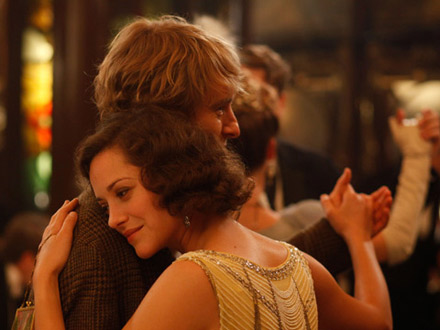There are times where I wonder what it’d be like to live in another time period. Sometimes it’s not just a general interest in the past, but more of a concrete period like the 40’s or 50’s.It’s no surprise that I’d feel this way because as humans we often see the past as being simpler than the time we currently reside in. I must say it’s easy to see how this happens considering that as time goes by, we often lose the context (or never gain at all) that is associated with a certain string of years or decades. Not to mention, history is almost always romanticized and fondly remembered outside the walls of a History lecture. This interest in returning to a simpler time, one that faces no uncertainties, is invariably running rampant through the mind of Gil Pender (Owen Wilson), the protagonist found in Woody Allen’s Midnight in Paris. Gil is a Hollywood screenwriter who has made his money writing big studio drivel, but at the moment he’s working on his first novel. It’s through novels that he hopes he can achieve writing legitimacy. Facing a bit of writer’s block and looking for something to reinvigorate his spirit, Gil and his fiancée, Inez (Rachel McAdams), tag along with their in-laws to Paris.
To many people, Paris is like the Mecca of romantic destinations. Day and night, the city emanates a romantic and whimsical glow that has been captured feverishly in the various forms of media that make up our lives. This grand view of Paris is entrenched in the mind of Gil who sees the City of Lights as a destination for himself. More specifically, he has a keen interest in 1920’s Paris. He’d be more than happy to settle down with his soon to be fiancée and live a life of solitude that’s filled with baguettes and the French persuasion. Unfortunately, Inez doesn’t partake in the dream, and she continuously tries to curb stomp it into submission. As a matter of fact, Gil seems more in love with the city than he does with what’s supposed to be his dream girl. We should probably hate Gil, but Woody Allen puts us in Gil’s corner right away with an opening montage of Paris’ that forces us to fall in love with the enchanting city. Said montage features well-known locales, as well as Paris’ hidden gems that can only be revealed when a person scours the nooks of the crowded metropolis. And that’s exactly what Gil does on a night where he simply feels like walking the streets of Paris. Partially drunk on an assortment of French wines and interested in finding inspiration from the streets of Gay Paris, Gil stumbles around the city aimlessly as he lets the sights and sounds dictate his direction. That is until a motorcade from the 20’s, chalk full of people dressed in 20’s attire, takes him to what appears to be a costume party. It isn’t.
Gil is literally transported back to 1920’s Paris, where he comes across the literary heroes that take up space on his bookshelf and the cultural icons that flood his mind. The likes of F. Scott Fitzgerald, Hemingway, Luis Bunel, and Pablo Picasso litter the time travel path that Gil takes. Within this time shift Gil makes a concerted effort to destroy his writer’s block by picking the mind of his heroes. Along the way, Gil falls for the celebrity chasing Adriana (Marion Cotillard), a woman who continuously finds herself in destructive relationships with 1920’s most influential men. Unfortunately, much like the night, Gil’s ventures into the past have a time limit and cease to exist once the sun rises. During the day, Gil struggles to connect with his disinterested fiancée, while at night he’s living a dream that would only exist in the movies. Thus comes the film’s conflict: Should Gil stay in the past or live in the present where the future is uncertain? It’s a question that’s shallow when compared to Woody Allen’s previous film inquisitions, but the question itself allows for a fun premise to develop and grand production to be on display.
First and foremost, Allen’s dedication to cement the film’s whimsical nature with terrific dialogue and visual panache (in conjunction with cinematographer Darius Khondji) shouldn’t go unnoticed. He’s on a level that he hasn’t completely accessed since Bullets Over Broadway. Paris, whether it’s shown in the present or with the drapery of the past, always looks stunning. In some regards, Allen’s selection of location and shots make Paris a character itself, as its buildings and monuments exhude a rich personality. Supporting Allen’s vision and love for Paris is an undeniably great cast, all of which get their moments to shine, but none are more pertinent than the performance of Owen Wilson. Wilson delivers a committed and enchanting performance as he distills the typical neuroses of Woody Allen protagonists into an endearing, idealistic man. Not since Wedding Crashers has Wilson been this charming, and truthfully, he probably delivers the best performance of his career. Now, Midnight in Paris isn’t perfect. At times Allen’s larger than life flourishes occur at the expense of character development, especially when it comes to Gil’s wife Inez. But what the film lacks in supporting character development, it makes up for with rapid fire dialogue and a freewheeling attitude. I can’t honestly say that Midnight in Paris is Allen’s greatest work, but it’s certainly his best film within the last decade, and one of the most worthwhile films to come out this year.

No comments:
Post a Comment